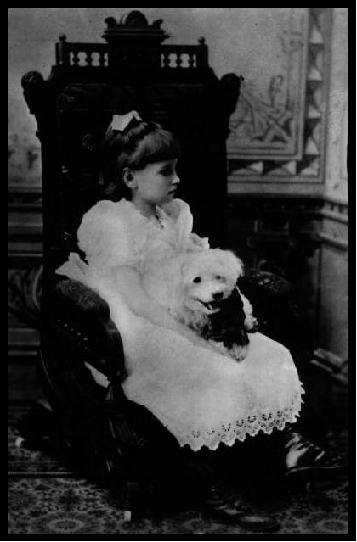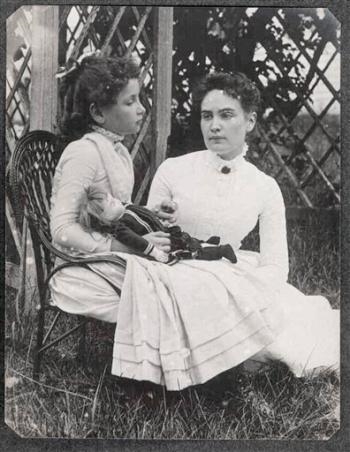In today’s society, people with physical or mental impairments have amazing opportunities to live their life to the fullest. However, life was very different for such individuals as Helen Keller. Born in the late nineteenth century, she soon became both blind and deaf. Despite her extremely limiting disabilities, she learned through hard work and perseverance. She utilized her struggle to inspire disadvantaged men and women and influence changes in the way they are treated. Her passionate fight to be heard cements her place among the world’s more empowering heroes.
 |
| Helen Keller's birthplace as it appears today. |
Helen Keller was born in Tuscumbia, Alabama on June 27, 1880. Her cheerful, spirited nature was apparent for the first nineteen months of her life. Then, disaster struck: Keller contracted a horrible fever. To the delight and relief of her parents, she recovered, but did not escape totally unscathed. The sickness had taken a terrible toll on her sight and hearing, leaving her completely blind and deaf.
 |
| Helen Keller as a young girl. |
For the next six years of her life, Keller spent her days in a dark and silent world, stranded on an island of isolation in the middle of a sea of voices she could not hear and sights she could not perceive. “Sometimes I stood between two persons who were conversing and touched their lips. I could not understand, and I was vexed.” (Helen Keller, Gale Resource Center) Her frustration with her inability to communicate sometimes boiled to the surface in destructive and violent behavior. Though she tried everything she thought possible, nothing seemed to work. Still, Keller dreamed of having the capability to communicate and interact with the world around her.
Such an achievement seemed light-years away until the Perkins Institute for the Blind dispatched a young woman named Annie Sullivan. Sullivan took on the incredible challenge of teaching Helen Keller to communicate. Keller resented her teacher’s methods and fought against every attempt to civilize her, until the fabled incident in which she placed her hand under a water spigot and had a revelation: that everything in existence has a name. Suddenly, she thirsted for knowledge. Of the challenges before her, she reflects: “There were barriers still, true, but barriers that could in time be swept away.” (Helen Keller, Gale Resource Center) She was willing to put in the vast amounts of extra work it would take to become well educated.
 |
| Keller with her teacher, Annie Sullivan |
And work she did, attending three schools from the age of ten. With the help of Miss Sullivan, Keller quickly learned such techniques as writing by hand, and typing and reading Braille. She even went above and beyond, becoming fluent in French and German. She graduated from Radcliffe College in 1904 with honors, proving to the world that she was ready for greater obstacles and more ambitious goals.
Fresh out of college, Helen Keller had completed her education and could now focus her energy on different pursuits. She wrote her first book, The Story of My Life, chronicling her struggles to be able to communicate and voice her own opinion. Keller authored many other volumes in her lifetime as well, each one not only telling her story, but giving motivation and empowerment to those who felt they could not change the world they lived in.
Her books were inspiring, true, but sometimes actions speak louder than words. Throughout her lifetime, Helen Keller traveled the world, advocating numerous causes such as the improved overall treatment of the disadvantaged. She lectured to audiences in Japan, India, Australia, “everywhere championing the disabled and the dispossessed.” (Gale Resource Center) Her tireless efforts to spread the word of equality through all states of disability and health made her prominent in the world of social reform.
She continued reaching farther and farther to help prevent disability, taking on such causes as educating the public about blindness in newborns. During World War II, Keller advocated for soldiers who had been blinded during battle. For every cause she promoted, Helen Keller confirmed what the public was growing to believe: that she was a strong, persevering woman who would stop at nothing to be heard.
Though she died in 1968, she has not been forgotten. Generations following her lifetime have studied her incredible story in school, and have been inspired by her hard work and dedication to apply those principles to their own lives. Her story advises us to look beyond our shortcomings, be the best we can be, and reach for the stars. Helen Keller once said herself, “…I am resolved to be myself, to live my own life and write my own thoughts.” Her words teach us not to let anything or anyone stand in the way of our goals. This is what she accomplished. This is why she remains one of time’s great American heroes.
Page created on 11/29/2010 12:00:00 AM
Last edited 1/6/2017 10:50:25 PM
